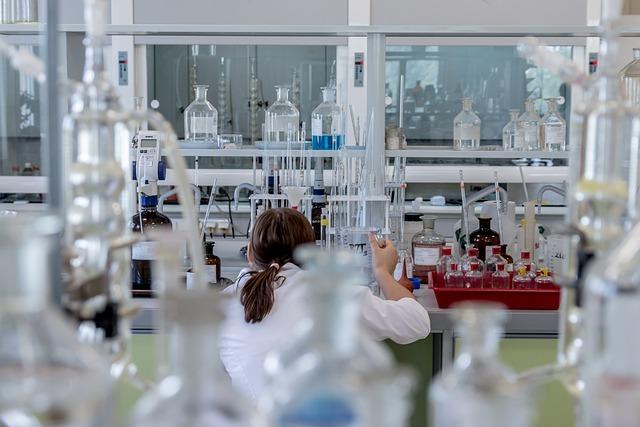Phoenix city officials have approved an $8.2 million contract to upgrade the heating, ventilation, and air conditioning (HVAC) systems at the city’s crime lab. The improvements aim to enhance air quality and environmental controls, reducing the risk of contamination and preserving the integrity of critical forensic evidence. This investment underscores Phoenix’s commitment to maintaining accurate and reliable criminal investigations, addressing longstanding concerns over lab conditions that could impact case outcomes.
Phoenix Invests Heavily in Crime Lab HVAC System to Ensure Evidence Integrity
In a strategic move to bolster forensic accuracy, Phoenix authorities have allocated $8.2 million towards the modernization of the crime lab’s HVAC system. This significant upgrade focuses on creating an environment that minimizes contamination risks, thereby safeguarding the integrity of physical evidence. The enhanced system will incorporate state-of-the-art filtration technologies and climate control mechanisms designed to meet rigorous standards critical to forensic investigations.
The investment aims to address longstanding concerns about airborne pollutants and fluctuating temperatures that can compromise sensitive materials. Key features of the HVAC overhaul include:
- HEPA filtration units to eliminate microscopic contaminants
- Improved airflow dynamics to prevent cross-contamination between lab zones
- Precise humidity and temperature controls to maintain optimal sample preservation conditions
- Energy-efficient systems designed to reduce operational costs while maintaining lab safety
| Upgrade Element | Function | Benefit |
|---|---|---|
| HEPA Filters | Air purification | Removes 99.97% of airborne particles |
| Airflow Controls | Zone isolation | Prevents sample contamination |
| Climate Regulation | Humidity & temperature | Preserves evidence condition |
Upgrading Climate Control Systems Key to Preventing Contamination in Forensic Analysis
Implementing state-of-the-art climate control systems is essential to maintaining the integrity of forensic evidence. Contaminants such as dust, humidity, and airborne particles can compromise samples, leading to inaccurate results and potential miscarriages of justice. The city of Phoenix recognizes this vulnerability and is investing $8.2 million to overhaul the HVAC infrastructure in its crime laboratories, ensuring the environment meets strict forensic standards.
Key upgrades include:
- Advanced filtration technology to capture microscopic contaminants
- Enhanced humidity and temperature regulation to preserve delicate evidence
- Automated environmental monitoring systems for real-time control and alerts
| Upgrade | Benefit | Expected Improvement |
|---|---|---|
| HEPA Filtration | Remove microscopic debris | 99.97% particle capture |
| Humidity Controls | Stabilize sample condition | ±5% RH consistency |
| Automated Monitoring | Immediate issue detection | 24/7 environment tracking |
City Officials Emphasize Importance of Modern Infrastructure for Reliable Crime Lab Results
City officials are dedicating significant resources to upgrading the HVAC systems in Phoenix’s crime laboratories to ensure the integrity of forensic evidence. Recent audits revealed that outdated infrastructure posed risks of environmental contamination, which could jeopardize the accuracy of forensic analyses. By investing $8.2 million, the city aims to modernize air filtration and circulation technologies to create controlled environments that meet strict scientific standards.
The comprehensive upgrade plan highlights several key improvements:
- Advanced air purification systems to minimize airborne contaminants.
- Improved temperature and humidity controls critical for sensitive sample preservation.
- Redesign of airflow patterns to prevent cross-contamination between lab sections.
- Compliance with federal and state forensic facility guidelines to bolster case credibility.
| Upgrade Component | Expected Impact | Completion Timeline |
|---|---|---|
| HVAC Unit Replacement | Enhanced air quality & reduced contaminants | 6 months |
| Environmental Monitoring Systems | Real-time data for lab conditions | 4 months |
| Airflow Reconfiguration | Elimination of cross-sample contamination | 5 months |
Recommendations for Ongoing Maintenance and Monitoring to Safeguard Forensic Investigations
To ensure the integrity of forensic evidence, it is imperative that crime labs implement rigorous and continuous maintenance protocols for their HVAC systems. Regular filter replacements, system calibrations, and periodic inspections must be scheduled to prevent particulate matter intrusion and cross-contamination. Employing automated air quality monitoring sensors can offer real-time data, enabling swift responses to any environmental fluctuations that jeopardize evidence preservation. Additionally, labs should adopt a standardized checklist to document every maintenance activity, fostering transparency and accountability.
Incorporating a multi-tiered monitoring approach greatly enhances the protective measures around sensitive forensic workspaces. The table below illustrates a recommended frequency and task breakdown for an ideal maintenance regimen:
| Task | Frequency | Purpose |
|---|---|---|
| Filter Replacement | Monthly | Maintain clean air flow |
| System Calibration | Quarterly | Ensure HVAC accuracy |
| Air Quality Testing | Biweekly | Detect contaminants early |
| Comprehensive Inspection | Annually | Verify overall system health |
Emphasizing a proactive stance with ongoing updates to HVAC technology will also reduce long-term risks. Coordinated collaboration among forensic scientists, facilities engineers, and external consultants is essential to tailor maintenance strategies that evolve with technological advancements and forensic demands.
In Retrospect
The City of Phoenix’s commitment to investing $8.2 million in HVAC upgrades for the crime lab underscores the critical importance of maintaining the integrity of forensic evidence. By addressing contamination risks through improved climate control and ventilation systems, the city aims to enhance the accuracy and reliability of criminal investigations. This significant expenditure reflects a proactive approach to bolstering public trust in the justice system and ensuring that forensic work is conducted under optimal conditions. As the project moves forward, stakeholders and residents alike will be watching closely to see how these improvements contribute to the overall effectiveness of law enforcement efforts in Phoenix.







